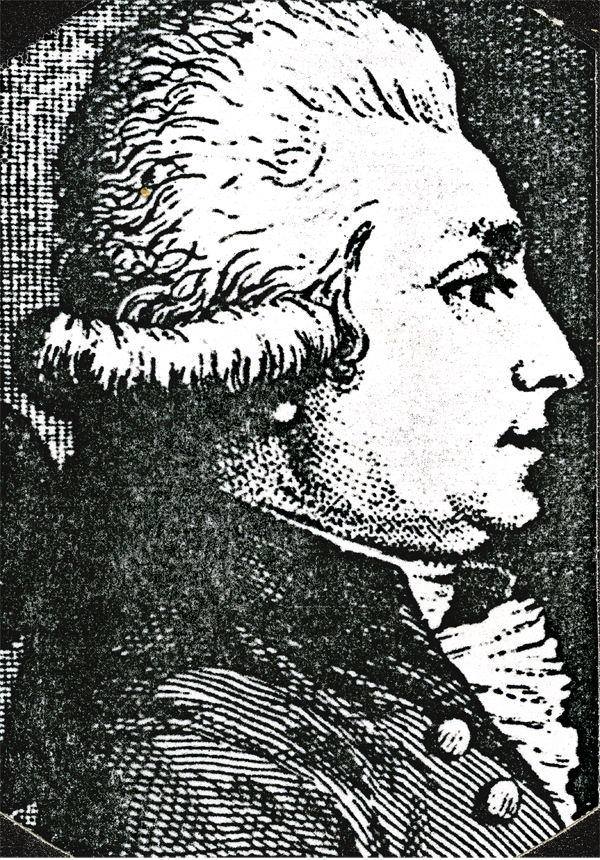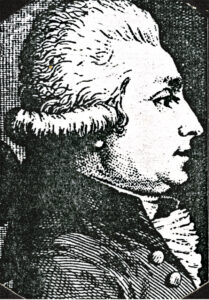Jean Jacques Blaise d’Abbadie
Jean Jacques Blaise D'Abbadie, an experienced naval officer and administrator, was one of three officials that Louis XV sent to govern French Colonial Louisiana in 1763.

Courtesy of Center for Louisiana Studies at The University of Louisiana at Lafayette
Jean Jacques Blaise D'Abbadie. Unidentified
Jean Jacques Blaise D’Abbadie, an experienced naval officer and administrator, was one of three officials that Louis XV sent to govern French Colonial Louisiana in 1763. (Nicholas Chauvin de la Frenier, attorney general, and Nicholas Foucault, intendant, were the other two.) D’Abbadie served as director-general, a position formed by the consolidation of the former governor and ordonnateur‘s positions. Although D’Abbadie was commissioned on February 10, 1763, his travel from France was not completed until June of that year. He served until 1765. He was primarily responsible for preparing the Louisiana colony for the transfer to the Spanish Crown, a shift that proved highly unpopular with local residents.
D’Abbadie was born at Château d’Audoux, near Navarrenx, Basses Pyrénées, France, in 1726 and educated at the College d’Harcourt, from which he graduated in 1742. He entered the royal service as a clerk in the lumber-receiving department of the Rochefort naval yard and served as a royal scribe in the comptroller’s office in 1743. A year later, he worked as a clerk in the naval repair shop. In 1745 he served aboard a French man-of-war in the Antilles. In Canadian waters in 1746, D’Abbadie was captured by English forces and held as a prisoner of war until the Treaty of Aix-la-Chapelle.
Following his release in 1748, he returned to the French naval bureaucracy and in 1751 was promoted to chief clerk of the artillery department. In 1757 D’Abbadie rose to the rank of commissary general in the naval office’s colonial bureau, and he served aboard a small French naval squadron that unsuccessfully attempted to deliver provisions to Louisbourg on Cape Breton Island in Canada.
He was commissioned ordonnateur (administrative chief and first judge of the colonial tribunal) of Louisiana on December 29, 1761, and ordered by the French Crown to establish and maintain good relations between the colony’s feuding religious orders, the Capuchins and Jesuits. His responsibilities also included efficiently administering Louisiana’s financial, police, and judicial affairs. Shortly after departing Bordeaux for the Louisiana territory, however, D’Abbadie’s ship was captured by English warships. He was held as prisoner of war at Barbados for three months and returned to France following his release.
In February 10, 1763, Louis XV commissioned D’Abbadie director-general (a position that consolidated former governor and ordonnateur positions) of Louisiana. The Crown then ordered him to dismantle the colony’s French garrison and prepare Louisiana for occupation by English and Spanish forces pursuant to the terms of two treaties: the secret Treaty of Fontainebleau (1762), which rendered New Orleans and Louisiana territory west of the Mississippi River to Charles III of Spain, and the Treaty of Paris (1763), which ceded French Louisiana east of the Mississippi to Great Britain.
He left Rochefort, France, for Louisiana on March 1763 and arrived at the mouth of the Mississippi River on June 21, 1763. After preparing for the transfer of the Angoumois Regiment from Louisiana to St. Domingue in July, he departed New Orleans for Mobile (then part of the Louisiana territory) to assist British forces in occupying West Florida and supervise the transfer of the region’s French soldiers to French-held territory.
During his limited time in office, D’Abbadie also worked to reconcile hostilities between the English and Native Americans while preventing France from being drawn into Pontiac’s uprising. Despite a complete lack of support from France, he also maintained a skeleton military forces in Louisiana long after the Spanish occupation forces were expected to arrive. The stress of governing a colony in flux led to a nervous illness disorder, from which D’Abbadie did not recover. He died in New Orleans from a stroke on February 4, 1765, before the arrival of the Spanish governor.
This entry was adapted from the Dictionary of Louisiana Biography, a publication of the Louisiana Historical Association in cooperation with the Center for Louisiana Studies at the University of Louisiana, Lafayette.
Sources: H. Froidevaux, “Abbadie (D’),” Dictionnaire de Biographie Française (1933- ); Marc de Villiers du Terrage, Les Dernières Années de la Louisiane française (1903); Carl A. Brasseaux, trans. and ed., A Comparative View of French Colonial Louisiana, 1699 and 1762: The Journals of Pierre Le Moyne d’Iberville and Jean-Jacques-Blaise d’Abbadie (1979).
